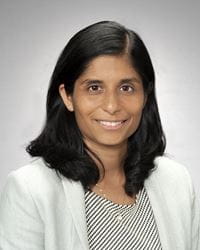Password Reset
Forgot your password? Enter the email address you used to create your account to initiate a password reset.
Forgot your password? Enter the email address you used to create your account to initiate a password reset.
5 Minutes
 The Heart Institute at UPMC Children’s Hospital of Pittsburgh is pleased to welcome Anita Saraf, MD, PhD, to the Institute. Dr. Saraf is fellowship-trained in adult congenital heart disease (ACHD) and joins the ACHD program, which is directed by Arvind Hoskoppal, MD. Dr. Saraf officially began her tenure at UPMC Children’s in August. Dr. Saraf holds dual academic appointments in the Department of Pediatrics and the Division of Cardiology in the Department of Internal Medicine at the University of Pittsburgh School of Medicine. In addition to her position in the Heart Institute at UPMC Children’s, she also is a member of the UPMC Heart and Vascular Institute.
The Heart Institute at UPMC Children’s Hospital of Pittsburgh is pleased to welcome Anita Saraf, MD, PhD, to the Institute. Dr. Saraf is fellowship-trained in adult congenital heart disease (ACHD) and joins the ACHD program, which is directed by Arvind Hoskoppal, MD. Dr. Saraf officially began her tenure at UPMC Children’s in August. Dr. Saraf holds dual academic appointments in the Department of Pediatrics and the Division of Cardiology in the Department of Internal Medicine at the University of Pittsburgh School of Medicine. In addition to her position in the Heart Institute at UPMC Children’s, she also is a member of the UPMC Heart and Vascular Institute.
Dr. Saraf earned her doctorate in bioengineering from William Marsh Rice University in Houston, Texas, and her medical degree from Baylor College of Medicine. Dr. Saraf then completed both her internal medicine residency and ACHD fellowship at Emory University School of Medicine in Atlanta, Georgia.
“As a physician-scientist, I wanted to join an institution where I could be surrounded by a robust research program where collaboration and leadership support are integral to its mission. Equally important to me is being part of a world-class clinical care program where patient outcomes are the focus and drive decision making across the institution. UPMC Children’s is just such a place,” says Dr. Saraf.
Dr. Saraf’s clinical practice encompasses the full spectrum of ACHD, with a special focus on Fontan patients and women with adult congenital heart disease.
"We have a great opportunity with the UPMC ACHD program to expand its scope of services to better reach an ever-growing patient population who need complex, long-term care to optimally manage their condition," says Dr. Saraf.
As a physician-scientist, Dr. Saraf became interested in studying biomarkers in adult congenital heart disease during her medical training at Texas Children's Hospital and continued that line of research at Emory University during residency and fellowship. While at Emory University, Dr. Saraf and colleagues established a biorepository for Fontan patients to study biomarkers and biomarker expression in this complex single ventricle congenital heart disease.
Dr. Saraf's research using data collected in the Fontan biorepository led to a new paper published in April in the International Journal of Cardiology which, among other findings, is the first to uncover that Fontan patients exhibit a chronically elevated inflammatory profile, together with a number of other cytokines as clinical markers of systemic dysfunction. These biomarkers, if monitored over time, can help clinicians predict which patients are about to get sick, long before they show any clinical signs. Biomarkers research in ACHD will continue to be a focus of Dr. Saraf’s research at UPMC Children’s.
Additionally, Dr. Saraf also is interested in determining how these biomarkers affect heart function. She currently is developing translational models that may help discover new therapies to help ACHD patients live longer and healthier lives.
In addition to her work on biomarkers in ACHD, Dr. Saraf also has investigated and published findings related to neurocognitive function in ACHD, and outcomes in pregnancy for ACHD patients.
Saraf A, DeStaercke C, Everitt I, Haouzi A, Ko Y, Jennings S, Kim J, Rodriguez FH, Kalogeropoulos A, Quyyumi A, Book, W. Biomarker Profile in Stable Fontan Patients. Int J. Cardiology. 2020 Apr 15; 305: 56-62.
Raskind-Hood C, Saraf A, Riehle-Colarusso T, Glidewell J, Gurvitz M, Dunn JE, Lui GK, Van Zutphen A, McGarry C, Hogue CJ, Hoffman T, Rodriguez Iii FH, Book WM. Assessing Pregnancy, Gestational Complications, and Co-morbidities in Women With Congenital Heart Defects (Data From ICD-9-CM Codes in 3 US Surveillance Sites). Am J Cardiol. 2020 Mar 1; 125(5): 812-819.d
Saraf A*, Book WM, Nelson TJ, Xu, C. Hypoplastic Left Heart Syndrome: From Bench to Bedside and Back, J Mol Cell Cardiol. (Review) 2019. Oct; 135:109-118.
Decades of advances in pediatric cardiology and cardiothoracic surgery have produced an ever-growing population of adults living long, relatively normal lives with various forms of adult congenital heart disease.
However, the growing population of CHD patients surviving into adulthood requires lifelong, complex cardiac care. Meeting this patient population's needs means expanding services, developing new models of care, and introducing technological advances to lower or remove barriers to care. The UPMC Adult Congenital Heart Disease program is rising to the challenge with a multifaceted approach.
The ACHD program operates on a unified, tri-campus model with UPMC Children’s, UPMC Presbyterian, and UPMC Magee-Womens Hospital serving as the hubs for clinical care for the entire spectrum of ACHD patients — younger or older, male or female.
Collaborations with the UPMC Heart and Vascular Institute and cardiology practices across the UPMC system and outreach to regional and community cardiology providers for referral needs and support are hallmarks of the program.
New to the UPMC ACHD program is a 24/7 consultation service for any patients admitted to the hospital for care of another condition or surgery, or for any ACHD patient who arrives through the emergency department for any reason.
Referring physicians can contact the UPMC Adult Congenital Heart Disease program at 412-692-3158 or by email at achd@upmc.edu.